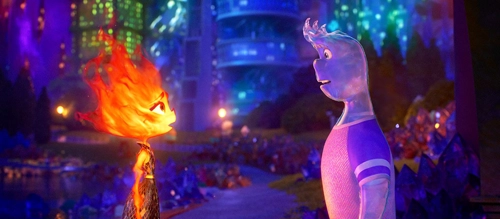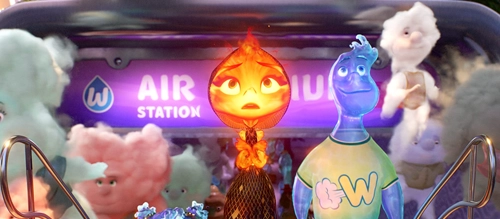Elemental (2023) Review

Elemental (2023)
Director: Peter Sohn
Screenwriters: John Hoberg, Kat Likkel, Brenda Hsueh
Starring: Leah Lewis, Mamoudou Athie, Ronnie del Carmen, Shila Ommi, Mason Wertheimer, Wendi McLendon-Covey, Catherine O’Hara, Ronobir Lahiri, Joe Pera, Matt Yang Kang
With dazzling, kaleidoscopic visuals and a sweet rom-com storyline, Elemental shows us that the things that make us different can also make us stronger. The latest entry into Pixar Animation’s beloved canon rehashes the time-honoured story of star-crossed lovers overcoming insurmountable odds to find happiness, this time through the eyes of the anthropomorphized natural elements of air, earth, water, and fire.
Elemental begins with fire immigrants, Bernie and Cinder Lumen (Ronnie del Carmen and Shila Ommi), moving to the towering metropolis of Element City. When they are shunned by the existing air, earth, and water residents, they build their own home in a deserted part of town where a vibrant community of other fire elements slowly grows up around them. The family runs a local shop, The Fireplace, with the help of their fiery, hot-headed daughter, Ember (Leah Lewis), who is expected to take over as owner once she learns to control her temper.
One day, when Ember’s anger self-combusts, she bursts the pipes in the basement, accidentally letting in a flood along with city inspector Wade (Mamoudou Athie), who writes up The Fireplace for building code violations. However, after learning how important the shop is to Ember and her parents, the bubbly and deeply sentimental water element agrees to help. The only way they can have the violations dismissed is to find and fix the source of the leak that caused the flood, sending the opposing elements on a quest to save the family business. As their sparking romance begins to burn, Ember and Wade must decide whether elements really can mix.
Director Peter Sohn, a mainstay at Pixar since his early days as a production and story artist on Finding Nemo (2003), based the story on his experience growing up as a son to Korean parents in The Bronx. In an interview with Jazz Tangcay at Variety, he explained that he wanted to celebrate the multiculturalism of his hometown whilst also illustrating the sacrifices immigrant parents make for their children.
Sohn examines the highs and lows of the immigrant experience, painting a complex picture of a supportive, joyous community with respect for their cultural traditions in contrast to the pain, embarrassment, and confusion of exclusion and otherness in their new city. Like xenophobic humans in our world, some air, earth, and water inhabitants view the fire residents as dangerous due to their ability to set other elements ablaze. Sohn, however, emphasizes that fire is important, helpful, and equally vulnerable… especially to water.
This analogy is not without its weaknesses, though. The characterization of the fire residents is ambiguous, relying on markers of real human cultures to distinguish this community from the rest of Element City. As Isaac Feldberg notes at RogerEbert.com, the ‘tight-knit community reflects East Asian, Middle Eastern, and European traditions—and accents run the gamut from Italian to Jamaican, Iranian, and West Indian.’ Through well-intentioned and often light-hearted homages to a variety of human cultures, the film unfortunately homogenizes the immigrant experience and leans dangerously close to stereotypes, such as Ember’s meddling matchmaker mother and Bernie’s ‘hot’ food that Wade struggles to swallow, further exoticizing the ‘other’ within the larger city.
Beyond the message about immigration and multiculturalism, the film also tries to address a plethora of other issues. Sohn and screenwriters John Hoberg, Kat Likkel, and Brenda Hsueh, draw parallels between the different elements and socioeconomic statuses in a cityscape reminiscent of Fritz Lang’s Metropolis; for instance, the elevated monorail system that is designed by and for water residents frequently rains down on the lower-income Firetown below. There is also Ember and Wade’s race against the clock to fight The Fireplace’s code violations, save the family business, and fix the source of the leak before it floods and destroys the city. These themes about social class inequities, municipal government stonewalling, and failing infrastructure are important, but the film addresses too many issues for any one of them to get enough airtime to be properly examined.

The strongest storyline at the core of the film’s narrative is the cross-elemental love story between fiery Ember and watery Wade, standing in for a human interracial relationship that challenges Element City’s status quo. Both characters are well-rounded in their own right, with Ember struggling to manage her temper and her sense of otherness in the city, whilst Wade tries to figure out his path in life after failing to reconcile his strained relationship with his late father. As these three-dimensional individuals slowly come together, their chemistry is undeniable. Wade’s boundless joy and hopeful attitude softens Ember’s temper, and her determination and loyalty to her family inspires him out of his aimlessness. Though they are initially fearful of touching and injuring each other as opposing elements, their differences end up bringing out the best in one another.
One of Elemental’s subplots dissects Ember’s relationship with her parents as she feels torn between her expectation to fulfil their dreams of her someday running the family business and her artistic talent, specifically glass blowing. Wade encourages her to follow her dreams, but she angrily explains that she cannot disappoint her parents when they sacrificed so much for her to have a better life. Their conflicting worldviews serve as a plausible dilemma that adds depth and showcases the supportive love at the heart of this inter-elemental romance. Wade’s goofy humour and immeasurable support for Ember and her dreams also place this romantic lead alongside other modern, non-toxic male Disney heroes in recent years like Frozen’s Kristoff.
Though a little predictable and formulaic, Ember and Wade’s love story and the obstacles they must overcome as a result are truly heartwarming and conveyed beautifully. Pixar has long been revered for its ability to communicate deeply emotional human stories through talking toys and cooking rats, and recently has started to tackle even more complex themes: mental health in Inside Out, death in Coco, the afterlife in Soul, and puberty in Turning Red. Where this film falls short of the studio’s true masterpieces is that it strays from the moving, intricate human story at the centre of the narrative in an effort to convey a message about too many complicated (though important) issues. Elemental would have done better to focus more squarely on one major theme to capture the magic of the studio’s earlier output.
Nevertheless, Leah Lewis and Mamoudou Athie deliver stellar vocal performances with a strong supporting cast including Wendi McLendon-Covey as air element and city employee Gale, and Catherine O’Hara as Brook Ripple, Wade’s kind and weepy mother. The film is also notable for its magnificent animation, especially its rendering of air, water, and fire, which have been notoriously difficult materials for computer animators to depict naturally in the past. According to Ethan Anderton at Slash Film, the animators admitted that they expected Ember’s character design to be the most technically difficult, but Wade’s rippling, bulbous water figure actually posed the biggest hurdle. Production designer Don Shank revealed that they tried to strike ‘a delicate balance between physics logic and cartoony appeal’ in the seven years it took to make this film.
Though Elemental is not perfect and will likely not topple fan favourite Pixar films like Toy Story, Up, and WALL-E from the top of anyone’s lists, Sohn’s love letter to his multicultural hometown is still a worthy watch this summer. Head to the cinema to fully appreciate the delicate, clever, beautiful city and character design on the big screen, and prepare to get sucked into the heartwarming love story at its centre.
Score: 18/24

